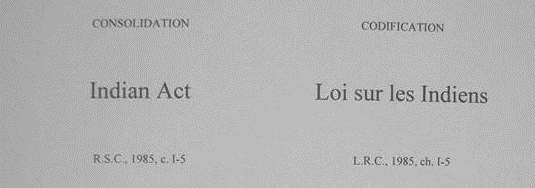The term Indian, when used to identify Indigenous peoples in South, Central and North America, is considered outdated and offensive. In Canada, the term has been used historically to refer to Indigenous peoples, but it also has modern legal significance. It is used to refer to legally defined identities set out in the Indian Act, such as Indian Status. For some Indigenous peoples, the term Indian confirms their ancestry and protects their historic relationship to the Crown and federal government. For others, the definitions set out in the Indian Act are not affirmations of their identity.
(The term Indian in the context of this article does not refer to Indian people of South Asia. For more information on people of that community, please see South Asian Canadians.)
Origin of the Term
The term Indian — when used to reference Indigenous peoples in the Americas, not people of South Asia — is believed to have originated with Christopher Columbus. In the late 1400s, Columbus believed he had reached Asia when, in fact, he had arrived in the Caribbean. The term has since persisted, and has been used indiscriminately to refer to all Indigenous peoples in North, Central and South America, with the exception of the Inuit in the Canadian Arctic, Greenland and Alaska. Outside legal definitions in Canada, the term Indian is no longer considered appropriate to refer to Indigenous peoples.
Uses of the Term
Historically, Indian has been used in Canada to refer to First Nations people, and in some cases, to refer broadly to Indigenous peoples. Today, terms like Indigenous and Aboriginal are considered more politically correct than Indian when referencing Indigenous peoples as a whole.
Since the Canadian government accepted the United Nations Declaration on the Rights of Indigenous Peoples without qualifications in 2016, the term Indigenous has been used widely in Canada to refer to First Nations, Métis and Inuit peoples.
While Aboriginal has fallen out of favour, in part due to the negative connotation some suggests it carries, the term is used in section 35 of the Constitution Act, 1982 and other pieces of legislation. Therefore, Aboriginal (like Indian) carries legal significance in Canada.
The word Native — another catch-all phrase sometimes used to refer to Indigenous peoples in Canada — is considered outdated and offensive by many because of its vagueness.
Legal Definitions
Section 35(2) of the Constitution Act, 1982 defines three groups of Aboriginal peoples — Indians, Inuit and Métis. Indians, in this case, refers to First Nations people. Legally speaking however, not all First Nations peoples are Indians — that is, not all have Indian Status. Indian is a legal identity that has been defined since 1876 by criteria set out in the Indian Act. The people who fit these criteria are known as Status Indians.
Inuit and Métis do not have status, just like Non-Status Indians. However, in separate judgments, the Supreme Court ruled that Métis and Inuit are the responsibility of the federal government (as opposed to provincial or territorial governments). In a 1939 ruling, the Court gave responsibility for Inuit affairs to Ottawa, and in 2016, it did the same for the Métis and Non-Status Indians. In doing so, the court has ruled that these peoples are included in the definition of Indian in section 91 (24) of the Constitution, which covers the federal government’s power over matters relating to “Indians, and Lands reserved for the Indians.”

 Share on Facebook
Share on Facebook Share on X
Share on X Share by Email
Share by Email Share on Google Classroom
Share on Google Classroom









